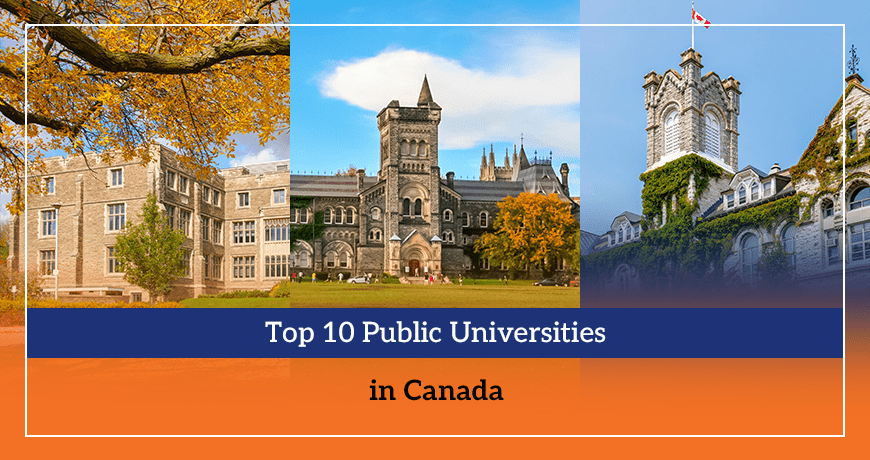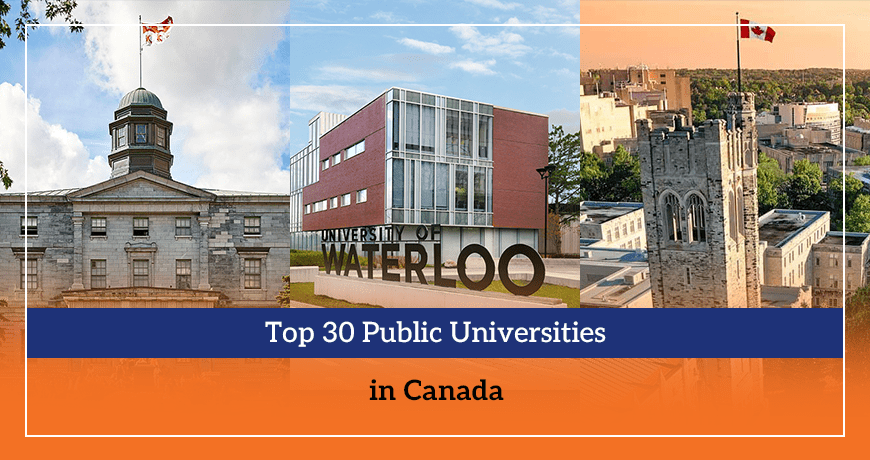Canada is considered one of the world's most well-reputed countries for higher education. These institutions are the backbone of the Canadian higher education system, and many international students fly to Canada to complete their higher education each year.
This article will inform you about the 10 top public universities in Canada and provide a list of the 30 best public universities in Canada and their basic details.
Overview of Public Universities in Canada
Canada’s public universities have a rich and longstanding history. They started in the early 1800s as small schools focused on religious studies. Over time, they grew more extensive and added more subjects.
There are currently 223 public universities in Canada. According to the THE World University Rankings 2023, more than 30 of these are the best ones. Over 15,000 study programs are available in different fields.
Canadian universities are known for their quality. Many are ranked highly in the world. Today, around 807,750 international students are studying here. The Canadian government plays a big role in supporting all these public universities. Through different policies, they have helped improve research, build better campuses, and keep education standards high.
One of the biggest strengths of public universities is that they make higher education accessible. Tuition fees are also more affordable than in many other countries, making it easier for both Canadian and international students to get a quality education.
Criteria for Ranking Public Universities
There are more than 100 public universities in Canada. We have set several criteria for determining the best public universities among those.
Academic Excellence
First, we’ve considered the academic excellence of all Canadian universities. Each university has qualified faculties. We have given priority to universities that have more reputed faculty. Student-to-teacher ratios and research achievements are also major factors in ranking among those universities.
Infrastructure
The quality of a university’s infrastructure is evaluated through its campus facilities. This includes the availability of well-equipped libraries, modern laboratories, and comfortable accommodations, etc.
Student Support Services
We have also ranked universities based on the support services they offer to students. These services include scholarships, financial aid programs, extracurricular activities, and career counselling.
Reputation and Accreditation
Lastly, a university's reputation and accreditation are important indicators of its quality. National and international rankings also indicate that the institution meets educational standards. So, we have considered universities that achieved recognition from reputable organizations.

Top 10 Public Universities in Canada
We know Canada is the home of many reputed universities. Those universities are highly recognized by students worldwide. Following the above criteria, we have listed the 10 best public universities in Canada.
1. University of Toronto
The University of Toronto is a big name when we talk about top-tier education in Canada. Established way back in 1827, it’s one of the oldest and most respected universities. With its three campuses, St. George, Mississauga, and Scarborough, it accommodates over 93,000 students.
The University of Toronto is a leader in many fields, especially medicine and engineering. Students get the chance to work on exciting projects.
As for the surroundings, you’re in the heart of Toronto, one of the most vibrant cities in Canada. The campus itself is a world of its own with everything a student might need. Plus, the city offers endless opportunities to explore, learn, and grow.
Key Departments
- Arts and Science
- Applied Science and Engineering
- Faculty of Information
- M.Eng in Civil
- Master of Nursing
- BBA
- MBA
Tuition Fee: 13,650 CAD - 63,768 CAD per annum
Undergraduate Duration: Typically four years.
Postgraduate Duration: 1-2 years for master's programs.
Established: 1827.
Total Programmes: 900 programs at the graduate and undergraduate levels.
Total Students: 93,000
Total Faculty: 16,503.
Location: Toronto, Ontario, Canada.
2. McGill University
McGill University is in the lively city of Montreal. Founded in 1821, it has a long history of academic success. McGill is famous for its strong programs in health sciences and research. What sets McGill apart is that it has many research centres that focus on important topics like sustainability and neuroscience.
Students at McGill often get involved in these projects, even as undergraduates. Also, while studying, students can enjoy local events and delicious food. Montreal is a fun city filled with festivals and culture.
Key Departments
- Medicine
- Law
- Management
- Engineering
- Arts
- BBA & MBA
Tuition Fee: 883.23 CAD - 900.38 CAD per credit
Undergraduate Duration: 3-4 years.
Postgraduate Duration: 1-2 years.
Established: 1821.
Total Programmes: 300 undergraduate programs.
Total Students: 39,513 (2022).
Total Faculty: 12000+
Location: 845 Sherbrooke Street West, Montreal, Quebec.
3. University of Ottawa
The University of Ottawa is in Canada’s capital. It’s the largest bilingual university in the world, with classes in both English and French. Established in 1848, it offers a unique experience for students. It has also ranked in the top 200 universities of QS World University Rankings for 2025.
Students love the University of Ottawa for its strong focus on public policy and health sciences. The university encourages research that addresses real-world issues. Being in Ottawa is a bonus. The city is full of history and culture. One can easily explore national sites and enjoy the vibrant atmosphere while pursuing their studies.
Key Departments
- B.Sc in Statistics
- M.A. in Economics
- Master in Computer Science
- B.Sc in Nursing, etc
Tuition Fee: 14,600 CAD to 77,345 CAD per annum.
Undergraduate Duration: 3-4 years.
Postgraduate Duration: 1-2 years.
Established: 1848.
Total Programmes: 550.
Total Students: 48,800.
Total Faculty: 10,000+
Location: 75 Laurier Avenue East, Ottawa, Ontario.
4. University of Waterloo
The University of Waterloo is a name that stands out, especially if you’re interested in technology or engineering. Founded in 1957, Waterloo has grown quickly and is now recognized globally for its innovative approach to education. It was one of the first universities in the world to offer students access to cutting-edge computers.
Waterloo's co-op programs are also a major draw. The city of Waterloo itself is a hub of innovation, with tech companies and startups around every corner. It’s an ideal place for anyone interested in working alongside some of the best minds in the tech industry.
Key Departments
- Master in Civil Engineering
- PhD in Civil Engineering
- Bachelor in Chemical Engineering
- Bachelor of Computer Science, etc
Tuition Fee: 45,000 CAD to 66,000 CAD for two terms.
Undergraduate Duration: 1-3 years (depending on co-op).
Postgraduate Duration: 1-2 years.
Established: 1957.
Total Programmes: 200 (Approximately)
Total Students: 40,513.
Total Faculty: 1,930
Location: 200 University Avenue West, Waterloo, Ontario.

5. Western University
Western University, located in London, Ontario, is another top public university in Canada. This institute ranked 50 in the QS World University Rankings for 2025. Founded in 1878, it has a rich academic excellence and research history and is well-known for its focus on research in health, business, and engineering.
Western students benefit from a highly supportive academic environment. Whether you’re interested in pursuing a career in finance, healthcare, or tech, Western offers a range of programs.
Key Departments
- Master of Professional Education
- B.Sc in Financial
- Master of Data Analytics, etc
Tuition Fee: 12,196 CAD to 11,70,800 CAD per annum.
Undergraduate Duration: 4 years.
Postgraduate Duration: 1-2 years.
Established: 1878.
Total Programmes: 160.
Total Students: 40,584.
Total Faculty: Around 5,000.
Location: 1151 Richmond Street, London, Ontario.
6. Queen's University
Queen’s University is in Kingston, Ontario, and has a long history, starting in 1841. This university is known for its strong community and academic programs. It has a vibrant student life and many opportunities to get involved.
Students are attracted to Queen’s for its business and public relations programs. The university emphasizes hands-on learning, which is a big plus. Students often participate in internships and community projects. Also, Kingston is a small, friendly city. It’s filled with history and offers beautiful views of the waterfront. Students can enjoy a peaceful environment.
Key Departments
- LLM
- M.Sc in Cancer Research
- PhD in Neuroscience
Tuition Fee: CAD 55,567 per annum.
Undergraduate Duration: 3-5 years.
Postgraduate Duration: 1-2 years.
Established: 1841.
Total Programmes: 207.
Total Students: 33,842 (2022).
Total Faculty: Over 4,000.
Location: 99 University Avenue, Kingston, Ontario.
7. York University
Another university in Toronto is York University. It offers a diverse range of programs. It’s known for being affordable and high-quality. Founded in 1959, York has become a popular choice for students.
The university stands out for its strong business and law faculties. York focuses on research and community involvement. Being in Toronto is also a major advantage. The city is alive with activities and opportunities.
Key Departments
- Master of Finance
- BBA
- MBA
- B.E in Computers
- M.A. in Economics, etc
Tuition Fee: 38,000 CAD - 100,500 CAD per annum
Undergraduate Duration: Typically three years.
Postgraduate Duration: 1-2 years for master's programs.
Established: 1959.
Total Programmes: 190 (Approximately)
Total Students: 55,700.
Total Faculty: 7,000
Location: Toronto, Ontario, Canada.
8. Trent University
Trent University is located in Peterborough, Ontario, Canada. It sits on the banks of the Otonabee River, surrounded by beautiful nature. The campus is known for its scenic views and green spaces. Founded in 1964, Trent University has gained a reputation for its strong focus on liberal arts and sciences.
Key Departments
- BBA
- Postgraduate Certificate in Marketing and Entrepreneurship
- B.Sc in Biomedical Science, etc
Tuition Fee: 19,110 CAD - 26,209 CAD per annum
Undergraduate Duration: Typically three years.
Postgraduate Duration: 1-2 years for master's programs.
Established: 1964.
Total Programmes: 200 (Approximately)
Total Students: 15,060 (2023–2024)
Total Faculty: 4700(Approximately)
Location: Peterborough, Ontario, Canada.
9. University of Regina
The University of Regina, located in Saskatchewan, is a great option for students seeking a unique experience. Established in 1911, it’s known for its strong community and supportive environment. The university focuses on social sciences, health, and engineering. Students can work on meaningful research that makes a difference in the community.
Regina is a quieter city, offering a relaxed atmosphere. While it’s not as big as some other cities, it has a close-knit feel that students often appreciate.
Key Departments
- Bachelor of Health Studies
- Bachelors in Finance
- Bachelor of Human Resource Management, etc
Tuition Fee: 27,780 CAD - 36,114 CAD per annum
Undergraduate Duration: Typically three years.
Postgraduate Duration: 1-2 years for master's programs.
Established: 1974.
Total Programmes: 200+
Total Students: 15,632 (2022)
Total Faculty: Ten
Location: Regina, Saskatchewan, Canada.
10. Dalhousie University
Dalhousie University is in Halifax, Nova Scotia. Founded in 1818, it’s one of the oldest universities in Canada. Dalhousie is well-known for its health and law programs, which attract many students each year.
The university has strong ties to the community. Students often engage in local projects. It has a rich history and plenty of activities for students. While studying at Dalhousie, students can enjoy everything from local events to exploring.
Key Departments
- B.Sc in Nursing
- Master in Computer Science
- BBA
Tuition Fee: 14,564 CAD - 41,830 CAD per annum
Undergraduate Duration: Typically, three years.
Postgraduate Duration: 1-2 years for master's programs.
Established: 1818.
Total Programmes: 200+
Total Students: 20,970
Total Faculty: Thirteen
Location: Halifax, Nova Scotia, Canada

Top 30 Public Universities in Canada
Here's a comprehensive list of Canada's top 30 public universities, including university names, locations, established years, and website links.
|
University Name
|
Location
|
Established Year
|
Website
|
|
University of British Columbia
|
Vancouver, British Columbia
|
1908
|
www.ubc.ca
|
|
University of Alberta
|
Edmonton, Alberta
|
1908
|
www.ualberta.ca
|
|
University of Calgary
|
Calgary, Alberta
|
1966
|
www.ucalgary.ca
|
|
Simon Fraser University
|
Burnaby, British Columbia
|
1965
|
www.sfu.ca
|
|
University of Victoria
|
Victoria, British Columbia
|
1963
|
www.uvic.ca
|
|
University of Manitoba
|
Winnipeg, Manitoba
|
1877
|
www.umanitoba.ca
|
|
Université Laval
|
Quebec City, Quebec
|
1663
|
www.ulaval.ca
|
|
Carleton University
|
Ottawa, Ontario
|
1942
|
www.carleton.ca
|
|
University of Saskatchewan
|
Saskatoon, Saskatchewan
|
1907
|
www.usask.ca
|
|
Memorial University of Newfoundland
|
St. John's, Newfoundland
|
1925
|
www.mun.ca
|
|
Concordia University
|
Montreal, Quebec
|
1974
|
www.concordia.ca
|
|
University of New Brunswick
|
Fredericton, New Brunswick
|
1785
|
www.unb.ca
|
|
University of Guelph
|
Guelph, Ontario
|
1964
|
www.uoguelph.ca
|
|
Ryerson University (Toronto Metropolitan University)
|
Toronto, Ontario
|
1948
|
www.torontomu.ca
|
|
Brock University
|
St. Catharines, Ontario
|
1964
|
www.brocku.ca
|
|
Lakehead University
|
Thunder Bay, Ontario
|
1965
|
www.lakeheadu.ca
|
|
Laurentian University
|
Sudbury, Ontario
|
1960
|
www.laurentian.ca
|
|
Université de Montréal
|
Montreal, Quebec
|
1878
|
www.umontreal.ca
|
|
Université de Sherbrooke
|
Sherbrooke, Quebec
|
1954
|
www.usherbrooke.ca
|
|
University of Northern British Columbia
|
Prince George, British Columbia
|
1990
|
www.unbc.ca
|
|
University of Prince Edward Island
|
Charlottetown, Prince Edward Island
|
1969
|
www.upei.ca
|
|
Mount Allison University
|
Sackville, New Brunswick
|
1839
|
www.mta.ca
|
|
Acadia University
|
Wolfville, Nova Scotia
|
1838
|
www.acadiau.ca
|
|
Bishop's University
|
Sherbrooke, Quebec
|
1843
|
www.ubishops.ca
|
|
St. Francis Xavier University
|
Antigonish, Nova Scotia
|
1853
|
www.stfx.ca
|
|
Wilfrid Laurier University
|
Waterloo, Ontario
|
1911
|
www.wlu.ca
|
|
Nipissing University
|
North Bay, Ontario
|
1992
|
www.nipissingu.ca
|
|
University of Windsor
|
Windsor, Ontario
|
1963
|
www.uwindsor.ca
|
|
Thompson Rivers University
|
Kamloops, British Columbia
|
1970
|
www.tru.ca
|
|
Cape Breton University
|
Sydney, Nova Scotia
|
1974
|
www.cbu.ca
|

Public vs Private Universities in Canada
Besides these public universities, many prestigious private universities exist in Canada. Those universities also offer a variety of courses, both short and long. However, there are a lot of differences between Canada’s private and public universities, such as:
Funding and Tuition Fees in Canada
Public and private universities in Canada differ significantly in terms of funding sources and tuition costs. Public universities receive substantial government funding. On the other hand, private donations cover private institute’s expenses. This caused higher tuition costs than public universities.
Program Offerings and Quality
Both public and private universities in Canada offer a variety of academic programs, but there are noticeable differences in their approach and scope. Public universities typically provide a broader range of programs.
Campus Life and Facilities
Public universities often have larger campuses with a wider range of facilities. Besides, private universities are generally smaller and may provide more modern or specialized facilities in specific study areas like technology or the arts.
Factors to Consider When Choosing a University
Choosing the right university sometimes becomes crucial for a student. The following factors may help you select the right university in Canada.
- Academic Fit: You must choose an institute that aligns with your career goal and academic interests. Ensuring a good academic fit helps you stay motivated and provides a clearer path toward achieving your professional goals.
- Financial Considerations: The cost of higher education can vary significantly between institutions. So, it's important to research universities in Canada to compare tuition fees and additional expenses and to choose a university that aligns with your budget.
- Campus Life: The University’s campus facility plays an important role in shaping your overall university experience. Look into what the university offers for its students. Better campus facilities and support systems can substantially impact your university life.
Application Process for Public Universities
While applying for a public university in Canada, you must fulfil some general admission requirements. Completion of secondary education is a must for undergraduate programs, and a bachelor's degree is required for postgraduate applications.
Some courses may also require a minimum GPA and standardized test scores. English language proficiency tests (e.g., IELTS, TOEFL, Duolingo) may also be required for international students in Canada.
After meeting the university admission requirements, you can follow these steps for application:
- Complete the online application form via the university's official portal.
- Submit the required documents.
- Pay the application fee (if applicable).
- Track your application status through the university's admissions portal.
Conclusion
Public universities in Canada offer high-quality education at affordable costs. Canada’s public universities have been attracting students from all over the world with their strong academic programs. So, if you’re thinking about studying in Canada, explore your options and apply early!